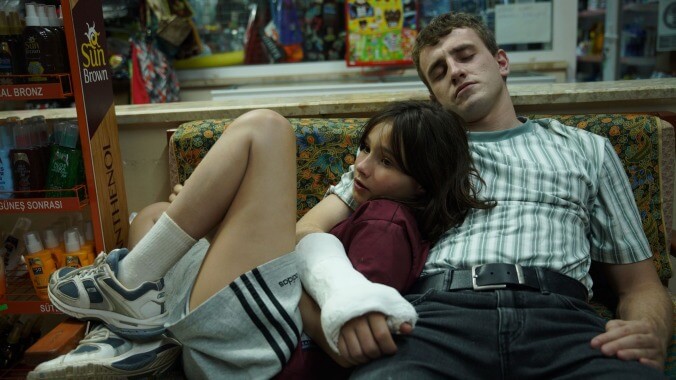In Aftersun, a father-daughter vacation turns memories into mesmerizing dreams
Writer-director Charlotte Wells, in an audacious if unpolished debut, transforms her half-remembered experiences into a terrific study of familial dysfunction

Early on in Aftersun, an 11-year-old girl tries to sleep while her father practices tai chi on a small balcony just outside her bedroom. White curtains cast a hazy glow over the open doorway separating father and daughter. As her breathing synchronizes with the rhythm of his swaying, the sound is muffled and a disorientation happens. Is it a dream? A memory? A hallucination? Turns out, it’s all three.
Written and directed by first-time Scottish filmmaker Charlotte Wells, Aftersun is inspired by memories from her own childhood. In the film, Sophie (Frankie Corio) takes a budget vacation to Turkey with her father, Calum (Paul Mescal). She’s been living with her mother in Scotland while he stays in London. Later, an adult Sophie (Celia Rowlson-Hall) reminisces about their trip, hinting that it’s the last experience she shared with her enigmatic father—a set-up that indicates this fictional story is inspired by true events, or perhaps a concocted memory that Wells conceived in place of her elusive real memories. Hence, Aftersun feels like a combination of memory and hallucination, but rooted in truth.
As their vacation progresses, Wells charts the emotional connection—and lack thereof—between father and daughter, following a series of small incidents and encounters that tell us how they feel about each other. While she offers no background details, it’s obvious that Calum was a teenager when he had Sophie. The age difference between them feels so small that other resort guests think she’s his sister. And even though Calum tries to be a present father for Sophie, his reckless youthfulness interferes; occasionally, he either sulks or abandons his responsibilities altogether. Yet Wells shows us an indisputably tactile relationship between father and daughter as the camera lovingly follows hands and limbs as they touch each other in ways that belie their deep connection.
Aftersun is as much a story of parental guilt as it is a childhood memory piece. Calum is able to be both loving and distant, and Sophie is confused by his different modes. Wells intercuts all that with the older Sophie as she becomes a parent herself. Mescal plays Calum with such acute melancholy that it raises the question: what has he seen in his short life? When he says that he can’t imagine reaching 40 because “30 was hard enough,” Mescal’s face shows a lifetime of pain. It can’t be just that he became a young father. It’s a performance that holds the fragmented narrative together. Coupled with his recent work with Emily Watson in God’s Creatures, another intense parent-child story, Mescal has quietly made 2022 his own. Meanwhile, Corio avoids the precociousness that mars many child actors, matching Mescal with a performance that feels confident beyond her years.
That same confidence distinguishes Wells’ work as well. For a new filmmaker, Wells trusts her actors to convey much more than is articulated in her scattered screenplay. She dramatizes memory, using home video footage that suggests the parts of our lives that we record aren’t necessarily representative of what actually occurs in them. Instead, the audience must decipher the difference. Even so, Sophie clings to her camcorder as the only tool that will allow her to see her father clearly, while Wells uses the resulting footage to highlight the elusiveness of memory, much less the sad realization that children may never understand their parents.
The disconnect between father and daughter is felt most vividly in an awkward karaoke scene, where R.E.M’s “Losing My Religion” immediately establishes the time in which this story takes place. It also exposes Sophie’s mindset, when she stubbornly performs alone, not so much singing it as angrily mouthing the words to antagonize Calum, after he refuses to join her. It’s in these specific moments Wells draws a sharp portrait of their relationship—yet much of the screenplay is comprised of nebulous, disconnected recollections. Though the choice may reinforce the notion of Aftersun’s narrative being as unreliable as memory, the eventual consequence is a partial loss of its dramatic impact.
However, despite Wells’ confidence as a filmmaker, Aftersun still succumbs to the predictable traps of films about childhood memories. Every small incident is presented as a big momentous event. That may be true from a child’s perspective, yet it still makes this narrative feel more formulaic than organic. Consequently, few of these beats feel revelatory to the audience, even when they are affecting. But Wells is undeniably a major discovery, and if its own flaws are the result of its filmmaker’s not yet mature eye, Aftersun announces the arrival of an artistic voice that moviegoers will be watching for many years to come.